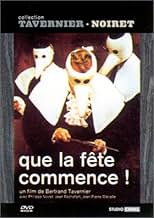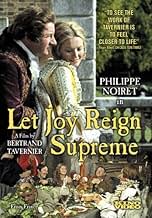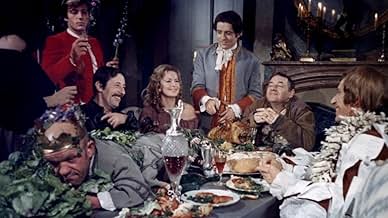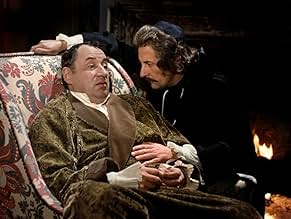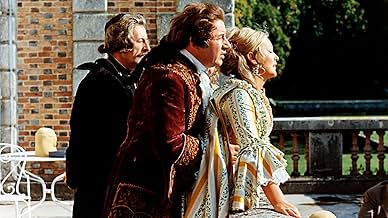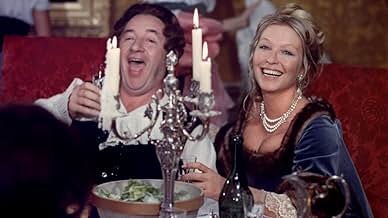IMDb-BEWERTUNG
7,0/10
1906
IHRE BEWERTUNG
Ein Blick auf das Frankreich des 18. Jahrhunderts, als die Verkommenheit der Behörden zur sozialen Unterdrückung beitrug und ein Aufstand nach dem anderen ausbrach.Ein Blick auf das Frankreich des 18. Jahrhunderts, als die Verkommenheit der Behörden zur sozialen Unterdrückung beitrug und ein Aufstand nach dem anderen ausbrach.Ein Blick auf das Frankreich des 18. Jahrhunderts, als die Verkommenheit der Behörden zur sozialen Unterdrückung beitrug und ein Aufstand nach dem anderen ausbrach.
- Regie
- Drehbuch
- Hauptbesetzung
- Auszeichnungen
- 5 Gewinne & 3 Nominierungen insgesamt
Empfohlene Bewertungen
This is one of my all time favorite movie and probably the best historical movie ever. One of the few movies featuring 3 of the best french actors (in leading roles): Philippe Noiret, Jean Richefort and Jean-Pierre Marielle. This movie is about how cynical France was ruled after the death of Louis XIV and while the new (Louis XV) was just a child. Don't expect a spectacular movie with great action and bloody violence (like Gladiator or Brave Heart). The pleasure with this movie is somewhere else: dialogs (brilliant), description of cynicism of the nobility and the actors performances (Jean Rochefort, playing L'Abbé Dubois, stoled the show).
This movie IT'S DEFINITELY NOT "probably the best historical movie ever" or "one of the few movies featuring 3 of the best French actors (in leading roles)",as someone SO WRONGLY says in a review!THESE ARE SIMPLY HUGE NONSENSES!First of all,this movie IT'S NOT AT ALL "probably the best historical movie ever"!To say something like this means that YOU DON'T KNOW ALMOST ANYTHING ABOUT THE HISTORICAL MOVIES!This film is pretty nice,but THERE ARE A LOT OF HISTORICAL MOVIES which are MUCH BETTER and which DEAL WITH MUCH MORE IMPORTANT HISTORICAL THEMES!Then,THIS IS CERTAINLY NOT "one of the few movies featuring 3 of the best French actors (in leading roles)"!THERE ARE A LOT OF OTHER MOVIES featuring 3 OR MORE of the best French actors in leading roles(obviously because such actors WILL ALMOST ALWAYS HAVE THE LEADING ROLES)!So,some people SHOULD REALLY STOP WRITING all kind of BIG NONSENSES like this in here!
It is unbelievable how the director Tavernier could recapture the mentality of this beginning of the 18th century which would lead to the French revolution. The wars of Louis XIV had ruined the country and the best thing the regent (an excellent Philippe Noiret but all the actors are excellent) could do was to avoid war, so they spend their time with feasts, manipulation, fraud and speculation. The mentality of the Noble of France is well described. There is (among others) an interesting dialogue between the regent and his nephew about the way the comte de Horn should be executed: it had never happened before (in this way: rouer) in France, and he only killed a speculator!. All those pretty details and the funny but accurate dialogues make of -this movie an unique historical document and at the same time it is a pleasure to see the movie again and again.
If you think 2020 is a decadent historical period with dubious morality and opportunist, cynical leaders primarily concerned with satisfying their personal pleasures, then you should try to compare with the year 1719 as presented in the film 'Que la fête commence ...' made in 1975 by Bertrand Tavernier. The English title is 'Let Joy Reign Supreme'.
Louis XIV (the Sun King, 'the state is me', etc.) had died for several years. His great-grandson, the future Louis XV, being a child, the affairs of the state were run by his uncle, the regent Philippe II d'Orleans (played by Philippe Noiret). The rengent was a liberal who had introduced timid political reforms, but also a libertine, an amateur of ever-younger mistresses, procured by his chief adviser, abbot Dubois (Jean Rochefort), a thruster whose main aim was to reach the rank of bishop despite his modest origins. At the royal court and in the palaces of the nobility debauchery, greed and immorality were the norm, and only death, sometimes tragic, sometimes stupid, interrupted the series of parties. The rest of the country mirrored in other shades and colors the same political and moral decay - priesthood was concerned with the excommunication of rats, the small nobility with separatist plots, and the simple people caring for the bread of tomorrow. The story follows the Breton plot led by the picaresque Marquis de Pontcallec (Jean-Pierre Marielle) and the way the higher classes react (or ignore) the growing social fermenting. The seeds of the revolution had been thrown away, but the century was still young and 70 years would pass until the fall of the Bastille.
With this film Bertrand Tavernier approaches a popular and successful genre of French cinema of the 50s and 60s - the cape and sword films, but his heroes are far from being gallant musketeers. The director seems to have not yet mastered the fluidity of the cinematic narrative, very visible in his next films, or he may have been more concerned with the elements of historical satire, the glove-less portrayal of the villains of the time hidden behind their carnival masks, of sarcastic criticism of the decay that rages behind the luxurious decorations and beneath the tables of copious banquets. The historical reconstruction is frothy, with many moments of cynical and extreme humor. Today's viewers who appreciate French cinema and its actors are offered the opportunity to see Philippe Noiret in one of his many notable roles and with Jean Rochefort who camouflages his inborn nobility to embody the role of the Machiavellian abbot who sets in motion political intrigues. The acting revelation, however, is Jean-Pierre Marielle, a lesser-known actor, who builds a memorable character, a kind of late and disturbed Don Quixote, a victim of his own ambitions. The film has a modern look and the 45 years since its creation only contribute to amplifying its effect on the viewers. Paradoxically, or perhaps not, the historical comparison seems even more actual today than it was then.
Louis XIV (the Sun King, 'the state is me', etc.) had died for several years. His great-grandson, the future Louis XV, being a child, the affairs of the state were run by his uncle, the regent Philippe II d'Orleans (played by Philippe Noiret). The rengent was a liberal who had introduced timid political reforms, but also a libertine, an amateur of ever-younger mistresses, procured by his chief adviser, abbot Dubois (Jean Rochefort), a thruster whose main aim was to reach the rank of bishop despite his modest origins. At the royal court and in the palaces of the nobility debauchery, greed and immorality were the norm, and only death, sometimes tragic, sometimes stupid, interrupted the series of parties. The rest of the country mirrored in other shades and colors the same political and moral decay - priesthood was concerned with the excommunication of rats, the small nobility with separatist plots, and the simple people caring for the bread of tomorrow. The story follows the Breton plot led by the picaresque Marquis de Pontcallec (Jean-Pierre Marielle) and the way the higher classes react (or ignore) the growing social fermenting. The seeds of the revolution had been thrown away, but the century was still young and 70 years would pass until the fall of the Bastille.
With this film Bertrand Tavernier approaches a popular and successful genre of French cinema of the 50s and 60s - the cape and sword films, but his heroes are far from being gallant musketeers. The director seems to have not yet mastered the fluidity of the cinematic narrative, very visible in his next films, or he may have been more concerned with the elements of historical satire, the glove-less portrayal of the villains of the time hidden behind their carnival masks, of sarcastic criticism of the decay that rages behind the luxurious decorations and beneath the tables of copious banquets. The historical reconstruction is frothy, with many moments of cynical and extreme humor. Today's viewers who appreciate French cinema and its actors are offered the opportunity to see Philippe Noiret in one of his many notable roles and with Jean Rochefort who camouflages his inborn nobility to embody the role of the Machiavellian abbot who sets in motion political intrigues. The acting revelation, however, is Jean-Pierre Marielle, a lesser-known actor, who builds a memorable character, a kind of late and disturbed Don Quixote, a victim of his own ambitions. The film has a modern look and the 45 years since its creation only contribute to amplifying its effect on the viewers. Paradoxically, or perhaps not, the historical comparison seems even more actual today than it was then.
This movie tackles heads-on a very interesting period in French history, when the nephew of Louis XIV , Philippe d'Orleans, was made regent for 10 years while Louis XV, a 5-year old child, waited for his majority. Its strength: the angle chosen by the scriptwriters, who encapsulate in 90 mn a sharp evaluation of the character of the Regent in the context of the era he lived in. The director makes the choice to shows us a man eager and able to do good for the country, while jaded in every other part of his life. The story is cynical and bawdy, but there is great wit in the dialogs, and very sharp moments of political observations relevant to the period (as well as to our modern period, frankly). We see the Powerful, the Entitled, the greedy, the ambitious and the scruple-free, and we occasionally glimpse at the rest: the Poor, brutalized and hopeless. I liked how the figure of Philippe d'Orleans, a libertine and miscreant who notoriously managed to govern France wisely against all odds, is humanized here by his keen intelligence of the facts around him, and how he grabs the viewers' empathy thanks to his self-awareness -and inherent compassion-while steeped in widespread decay. Whether, as a ruler, he deepened that general decay with his own turpitudes, or whether despair in front of its extent prevented him from fighting it is the question the film poses.
Unfortunately, this sharp attention to the character of Philippe is not given to the rest of the production. There is a feel of 'made for TV" movie about both the production and the casting. The main parts (Rochefort, Marielle and Noiret, Vlady) are wonderfully acted and utterly believable; but the rest of the cast feels like a bunch of extras hired on the run, thrown a costume and told to look and act "peasant", "soldier", "nun", "nude prostitute", "blind musician". I noted for instance that all the "starving" peasants look in fact well fed, and that the château's staff is forever statically sweeping the floor or pouring liquids in glasses. It seems no one cared to give them real directions, and that flaw distracted my attention too often. As a historical or political pamphlet, Let Joy Reign Supreme is truly a compelling movie to watch. But as a work of art, it left me wanting.
Unfortunately, this sharp attention to the character of Philippe is not given to the rest of the production. There is a feel of 'made for TV" movie about both the production and the casting. The main parts (Rochefort, Marielle and Noiret, Vlady) are wonderfully acted and utterly believable; but the rest of the cast feels like a bunch of extras hired on the run, thrown a costume and told to look and act "peasant", "soldier", "nun", "nude prostitute", "blind musician". I noted for instance that all the "starving" peasants look in fact well fed, and that the château's staff is forever statically sweeping the floor or pouring liquids in glasses. It seems no one cared to give them real directions, and that flaw distracted my attention too often. As a historical or political pamphlet, Let Joy Reign Supreme is truly a compelling movie to watch. But as a work of art, it left me wanting.
Wusstest du schon
- WissenswertesAgnès Château's debut.
- VerbindungenReferenced in Des Bronzés au Père Noël, la folle histoire du Splendid (2014)
- SoundtracksGénérique: Forlane / Penthée Acte V)
Composed by Philippe d'Orléans
Top-Auswahl
Melde dich zum Bewerten an und greife auf die Watchlist für personalisierte Empfehlungen zu.
- How long is Let Joy Reign Supreme?Powered by Alexa
Details
- Erscheinungsdatum
- Herkunftsland
- Sprachen
- Auch bekannt als
- Let Joy Reign Supreme
- Drehorte
- Produktionsfirmen
- Weitere beteiligte Unternehmen bei IMDbPro anzeigen
- Laufzeit
- 1 Std. 59 Min.(119 min)
- Sound-Mix
- Seitenverhältnis
- 1.85 : 1
Zu dieser Seite beitragen
Bearbeitung vorschlagen oder fehlenden Inhalt hinzufügen

![Bande-annonce [OV]](https://m.media-amazon.com/images/M/MV5BYzg1NDE4N2EtN2FiMi00MmEwLTkwM2UtMDNkMDA5Y2ZmODE5XkEyXkFqcGdeQXRyYW5zY29kZS13b3JrZmxvdw@@._V1_QL75_UY281_CR0)
